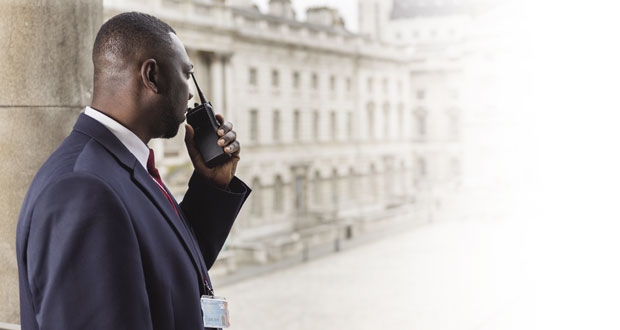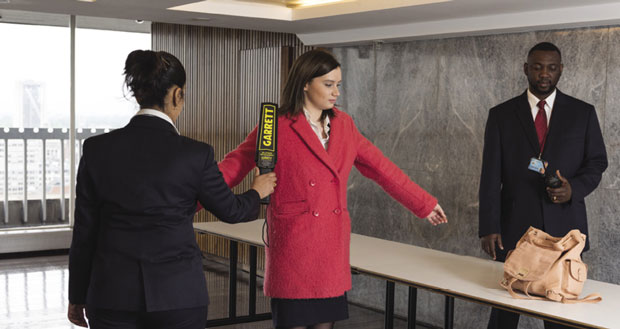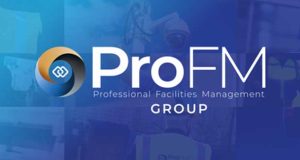Security teams are employed to protect people and property. With the COVID-19 pandemic, they are stepping up to help enforce social distancing and mask wearing. We’ve gathered a range of views from security specialists on what this means for security people now and into the future
The perception of security officers has changed in recent years but none more so than during the last six months. Its modern-day role is more than just a guard within a gatehouse, explains Steven Moore, Managing Director of Security, Atalian Servest.
“When the COVID-19 pandemic took hold, the role of the security officer saw a greater transformation. Rightly so, there was an expectation to protect properties and assets but most importantly, the wellbeing of people. This rocketed to the top of the agenda. For security officers, this involved new responsibilities including implementing temperature screenings at entrances to buildings, enforcing mask-wearing and managing social distancing and one-way systems around properties.”
Security officers have many other skills that have set them up well for dealing with the crisis and their new responsibilities argues Darren Read, Managing Director, Amulet. “Officers have public-facing roles, such as front of house and in retail centres. Many of these are soft skills such as communication and problem solving, duties that require tact, delicacy and empathy.”
According to Nigel Davies, Director of Security for Salisbury Group, while some organisations are using automated access control and visitor systems, at the many buildings without this kind of tech, security officers who have previously been tasked to record visitors, contractors and issue passes must oversee safe signing in procedures. “When issuing or checking passes, our officers ask each person to confirm they do not have COVID-19 symptoms. They are also briefed to look for symptoms and to tactfully prevent entry and report to management if they suspect a person to be infected.”
As returning employees find their offices changed to allow for social distances, this is likely to be most evident at the entrance and reception areas and major pinch points, says David Mundell, Managing Director, Axis Security.
“Security teams at multi-tenanted buildings, for example, have been instrumental in implementing new procedures that allow for social distancing, as well as helping to educate and remind returning employees and visitors of new one-way systems, or new processes they need to follow.”
DEMAND FOR SECURITY STAFF
The level of demand for security staff during the pandemic has been sector dependent says Mundell, with some sites requiring more security and some less at any given moment. He predicts this will continue to change depending on the movement of people and how long it takes the UK to get back to normal. “Foot-fall is down in the world of the arts and entertainment but educational sites are opening up new learning areas to allow for better social distancing between students and so this requires larger security teams.”
Davies of Salisbury Group explains that to help make buildings COVID-19 Secure, many clients are separating access/egress points as part of risk control measures. This requires additional staffing. “The main draw on security resource at present is in NHS Testing Centres, supporting local authorities and retail sectors. The UK Government are giving a further £30 million to local councils to enforce restrictions some of which will be spent on ‘COVID Marshalls’ and of course the private security industry will be only too willing to support this.”
At Amulet says Read there has been a requirement to provide extra support to customers in ensuring their premises are operating in COVID-secure environments. “This is particularly true where our customers business involves direct engagement with the general public. A great example would be the work our teams are carrying out across large parts of the rail network. Working alongside our customers, we are ensuring that passengers are not just made aware of the rules but that that our presence serves to reassure and advise all on safe travel measures.”
Mike Bullock, CEO, Corps Security contends that alongside NHS facilities and supermarkets, where there is demand for a higher volume of officers, “there are also sectors such as logistics, where, for example, the core business activity hasn’t changed, but the pandemic has presented officers with an increased remit of duties to carry out. Distribution centres have a constant flow of people coming and going and checking these people in and out and ensuring they adhere to COVID-safe measures takes a lot of time to manage.”
KEEPING SECURITY STAFF SAFE
The numbers of security people working alone has increased, especially in office buildings which remain shut or severely reduced, and responding to this at Salisbury says Davies: “We have revised all core security duties, assessments and Standard Operating Procedures (SOP’s) to reflect risks. Established lone working protocols and procedures exist as part of risk control measures for a number of situations as part of the company safeguarding policy, such as working during nights and weekends, but are now expanded in buildings or areas where people, property or assets have become more vulnerable due to the absence of workers.”
The measures include lone worker checks via a control room set at varying intervals or prior to or during patrols. All sites are equipped with mobile phones and where appropriate GPS based guard patrol systems enabling active tracking of patrols. The devices also have a panic button and ‘person down’ facility which can be used to summon assistance.
He adds: “Regular contact with line management is particularly important in conducting welfare checks and supporting our officers during this difficult period. Security hours are lengthy, and an empty workplace can be a lonely place for security officers used to being involved dynamically with a client’s business in a once vibrant building. The company also has a range of staff assistance programmes such as Healthy Living, Mental Health Awareness, Positive Thinking, and Wellbeing.”
The use of Bodycams by Amulet, reports Read can deter aggression against lone workers and can also provide both audio and video monitoring from a remote centre that provides great reassurance for individuals faced with challenging situations. At Atalian Servest they’ve employed a ‘push-to-talk’ capability where the central control system is notified and can use live GPS tracking to contact the security officer.
“In addition to this function,” says Moore, “the application will also trigger an alarm if the device has not moved for a set period, and the geo-fencing ability will flag if an officer leaves a zone or, enters an area that they are not permitted to enter.”






